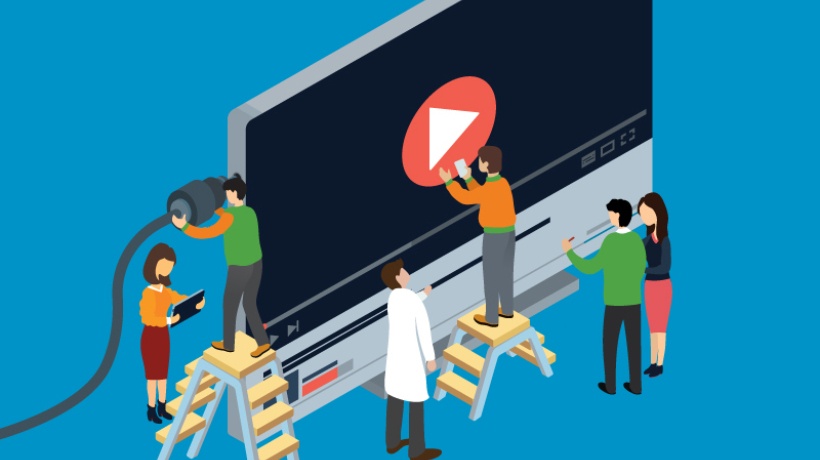Keep Them Short, Crisp, And Relevant
One of the biggest challenges facing Learning and Development leaders today is capturing learner attention spans. Concurrently, the volume, velocity, and complexity of change make the need for learning speed imperative. Today's learners are primarily from Gen Z and have an attention span between 8 and 12 seconds. Microlearning videos are an effective way to capture and hold such short attention spans. Microlearning is learning that is delivered in short, compact chunks. Microlearning videos are short, bite-sized videos, typically spanning between 30 seconds to 3 minutes, designed to deliver specific pieces of information concisely and engagingly. These videos often include visuals or graphics to help reinforce the learning conveyed. They are a key 2023 trend that will continue to grow.
The Benefits Of Microlearning Videos
Microlearning videos can be used in various learning experiences, including teaching the practical steps of a process, offering a deeper dive into a vital aspect of a topic, or forming a sequence of learning experiences. Some examples include micro-videos on TikTok, YouTube, and Vimeo, amongst others. Microlearning videos offer several benefits, including convenience, engagement, time efficiency, customization, reinforcement, and accessibility.
Convenience
Microlearning videos are convenient because they can be accessed from anywhere and anytime. Learners can access these videos on their smartphone, desktop, laptop, or tablet on the go, at home, or in the office. This is particularly valuable to learners who may not be able to attend in-person training.
Engagement
While Learning and Development teams often focus on producing well-scripted microlearning videos, social media such as YouTube and TikTok have proven that clarity and brevity are much more critical for keeping learners engaged. Videos offer a visual and audio combination of images, graphics, voice, music, and concise information, which can help learners remember better and longer the learning nugget conveyed.
Time-Efficiency
Microlearning videos typically span between 30 seconds to 3 minutes. The time constraints of the video require videos to be crisp and to the point, enabling the learner to save time while learning. Instead of spending hours on end searching for relevant content and sitting through long and tedious content, learners can watch a few microlearning videos and still receive the same amount of learning.
Customization
Microlearning videos can be customized to meet the specific learning needs of the individual. Learners can choose the videos that are most relevant to their learning goals, and they can watch them at their own pace. This ensures that the learner is not overwhelmed with irrelevant information and can focus on the areas where they need the most support.
Cost-Effectiveness
Microlearning videos can be more cost-effective than traditional learning methods. They eliminate the need for expensive textbooks and resources and are often free or more affordable than in-person training. A great example of microlearning videos are those offered by TED.com, MasterClass.com, and BigThink. This can be especially helpful for organizations operating on tight budgets and for learners who are looking for ways to upskill without burdening their wallets or pocketbook.
Reinforcement
Microlearning videos can be used to reinforce the information that has already been learned. The Ebbinghaus forgetting curve research shows that learners forget 90% of what they learn over the following seven days. Microlearning videos can serve as memory joggers, nudges, and refreshers of critical microlearning bites. For example, if a learner has already completed a course or training program, they can watch microlearning videos to reinforce the key concepts and ideas of the program. Reinforcement is critical as learners can receive nudges and reminders on their smart devices to watch a particular micro-video to refresh their learning.
Accessibility
Anyone can access microlearning videos, regardless of age, background, or circumstances, via a desktop, laptop, or smart device. This makes learning more inclusive and accessible, which is especially important in implementing diversity, equity, inclusion, and belonging.
The Drawbacks Of Microlearning Videos
While microlearning videos offer several benefits, they also come with some key drawbacks that you and your team will need to consider, including a limited scope and limited interaction with the learner.
- Limited scope
Due to their short duration, microlearning videos may not be able to cover complex topics comprehensively. This could result in a lack of depth and detail, which may leave learners with an incomplete understanding of the topic. - Limited learner interaction
Microlearning videos are usually a one-way form of communication. The learner passively watches the video without having many opportunities to interact with the content or provide feedback to the content creators. As such, these videos may not be ideal for learners that prefer more hands-on, interactive learning experiences. - Limited ability to measure learning outcomes
Due to their brevity, microlearning videos may not provide enough information to assess a learner's understanding of the content properly. Well-structured microlearning videos are aligned with one or two learning objectives. While you may not be able to measure learning outcomes, you will be able to see how many views the video garnered, which indicates how engaging or valuable learners deem the content. - Potential for information overload
While these videos are designed to be short and concise, there is still a risk of overwhelming learners by trying to fit too much information in the video all at once. This could result in learners feeling confused or overwhelmed, negatively impacting their learning experience.
Conclusion
Microlearning videos provide a convenient, engaging, and cost-effective way to learn, and they can be customized to meet the specific learning needs of the individual. They can help learners achieve their learning goals more efficiently and effectively because they can learn faster and remember what they have learned longer. However, microlearning videos also bear four key drawbacks: limited scope, limited interaction with the learner, limited opportunity to measure learning outcomes, and potential information overload. These drawbacks are worth considering as you curate learning for your organization. You will weigh the pros and cons of these videos, collect learner feedback and preferences, and launch your effort. As you and your team want to jumpstart upskilling in your organization to help learners advance their skills, explore new topics, and embrace lifelong learning, you can explore curating microlearning videos.








